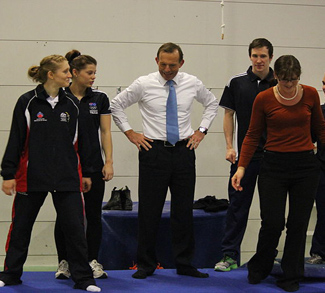Australia has just gone through a lackluster election, where a change of government took place. Tony Abbott will be Australia’s next prime minister. However, this change appears to lack the euphoria of past elections that delivered new governments, like ’72, ’75, ’83, ’96, and ’07. This might have to do with widespread fears that an Abbott government will bring Australian public policy back to the Howard era.
When the election was announced to the Australian public via Twitter early August, the polls indicated that both major parties were almost neck and neck. There was some feeling that the very confident and accomplished campaigner Kevin Rudd could take over the ‘popular-scape’ as an underdog and run the Labor campaign as an opposition would, thereby pushing Abbott out of contention. Rudd showed pragmatism, exposing many faces to the electorate over the campaign while Abbott early on looked to be on the defensive, avoiding Rudd’s early challenge to an immediate debate the very week the election was called. Abbot instead chose to stick to the reverberating rhetoric that he has been using over the last couple of years.
Both leaders were ambitious, full of energy, and gave an impression that they have a lot to prove in vying for the top spot in Australian politics, which consequently turned the campaign into a presidential style onslaught towards the public. Both leaders engaged the budget, boatpeople, and taxes in a transactional manner, leaving the big visions primarily out of the debate. Nothing new and substantial came out of the campaign. Some promises were even withdrawn or modified and both leaders often had trouble answering any detailed questions from the media. Both sides showed major flaws which weren’t really scrutinized to any great degree, which in turn seemed to drain credibility from the campaign. It could be argued that any credibility was precluded by a general apathy in the Australian electorate, especially the young.
It wasn’t long until the Rudd of old emerged; the one that makes up policy on the run without any consultation with the Melbourne campaign office.
Although Labor had handled the 2008 financial crisis well, avoided recession, kept Australia’s debt as one of the lowest in the developed world, and maintained a AAA credit rating, Labor found it extremely difficult to hide its entropic disunity, and the party’s popularity began steadily plunging as the campaign progressed. The absence of Julia Gillard at the Labor campaign launch was truly symbolic of Labor’s problems. One group within Labor claim the Gillard takeover of the leadership in 2010 was the beginning of Labor’s problems, while another group is still angry over the Rudd sabotaging of the 2010 Labor campaign.
This wound is mortal to Labor and must be passed over if Labor is ever to be an electoral force again.
As all the pre-election polls predicted, the coalition came away with a convincing victory. Rudd failed to give voters anything new to hope for and Abbott managed to avoid any major campaign mistakes. It appeared the Australian electorate had long made their decision for change before the campaign even started. Moreover, Rudd’s realignment of Labor policies towards Abbott’s may have played some role in convincing many voters to support the minor parties, which now hold a potentially antagonistic balance of power in the senate. All this just seemed to raise Abbott’s status, especially with the negative campaign that Labor ran against him.
The Rudd campaign failed dismally. By the Tuesday before the election Rudd appeared to have given up, while his deputy Anthony Albanese even admitted on radio that Labor was heading towards defeat. Labor’s private polling showed a 4-5% swing against it, though most of this went towards minor parties, thus minimizing electoral losses since the coalition only gained around 1.5%.
By 6.30pm on election night the fate of Labor was apparent, receiving the lowest primary vote in over one hundred years.
Rudd had no personal achievements to fall back on, and it looks like he just became the ‘fall guy’ for Julia Gillard.
It will long be a matter of conjecture as to whether Labor’s change over to Rudd from Gillard really made any difference at all, although Rudd proudly claimed in his conciliation speech that he managed to ‘save the furniture’, staving off a complete political wipeout and keeping a credible force in parliament.
Australia woke up on Sunday morning to a new prime minister designate Tony Abbott. Until now he has avoided close scrutiny and was a most unlikely Liberal leader, only just scraping in to the party leadership back in 2010 by one vote. Although he has been in public life for almost 20 years, he is still a paradoxical mystery.
Many have labeled Tony Abbott a masochistic fitness fanatic with conservative Christian values, and policy inclinations going back to the Howard era where he served as a minister for nine years. Some believe that Abbott will ruthlessly cut government spending in education and health to the point where people suffer in the name of a balanced budget. He is expected to do little, if anything, about climate change due to his personal skepticism, and he is also expected to reopen the debate on carbon and mining taxes all over again. For these reasons, many believe Abbott will swing Australia back towards conservatism.
Tony Abbott will find the transition from opposition leader to prime minister challenging, especially in facing the fiscal realities of government, finding a balance between ex-Howard ministers and the large number of new parliamentary members, and dealing with a potentially hostile senate. However a look at his past career and personal history hints that Tony Abbott may not be the type of prime minister that many fear. Much of Abbott’s public persona is a media creation, his life gives another story.
Tony Abbott is a Rhodes scholar who graduated with a MA in politics and philosophy at the prestigious Queens College at Oxford University. He was one of the architects of former opposition leader John Hewson’s ‘fightback’ package during the 1990s.
Tony Abbott was a journalist at the influential magazine The Bulletin and newspaper The Australian, a plant manager at Pioneer Concrete, and even studied theology for three years at St. Patrick’s Seminary in Sydney. This has given him wide exposure to influential people within Australian society on all sides of politics. He was first courted by senior members of the New South Wales labor movement including former Premier and Foreign Minister Bob Carr to join the Labor party and run for parliament. By Abbott’s own admission, he even voted Labor in the 1988 state election.
Abbott also served as the national convener for Australians for a Constitutional Monarchy (ACM), when then-Prime Minister Keating brought the idea of an Australian republic into the national debate. This is the time when Abbott met and worked with John Howard, who in 1994 encouraged him to seek Liberal pre-selection for the Federal seat of Warringah.
When Tony Abbott was parliamentary secretary to the Minister of Employment and Education, he set up the Green Corps program which engaged young people in environmental reconstruction work. He instigated work for the dole program as Employment Services Minister and commissioned the Cole Royal Commission into gangsterism and corruption in the construction industry, establishing the Office of the Australian Building and Construction Commissioner with the objective of lifting industrial productivity. As Health Minister, Abbott managed to stop doctors abandoning the Medicare system. While on holiday in Bali with his family in 2005 when the Bali Bombings occurred, Abbott visited the victims in hospital and arranged their evacuation to Singapore.
Tony Abbott also performed a number of heroic acts. During his student days, he saved a drowning child from being swept out to sea and later in his university days he helped to rescue children from a burning building next to the hotel he was drinking in. According to newspaper reports, on both occasions he never stayed around to be properly thanked.
From Abbott’s student politics days until now, his views on issues like abortion, euthanasia, and gay and lesbian marriage seem to be more influenced by his personal experiences than his theological background. He believes that he fathered a child out of wedlock and the child was put up for adoption, and he has received a lot of support from his lesbian sister. From this perspective Tony Abbott displays humanistic considerations and has given deep thought to the logic and rationale behind his beliefs. For example, he believes that legalized euthanasia would open the way for unscrupulous children to terminate the lives of relatives for reasons other than health and comfort.
Tony Abbott is a volunteer member of the NSW Rural Fire Service, and as an opposition spokesperson on indigenous affairs, he spent a number of weeks teaching in remote communities in Cape York in 2008 and 2009.
Abbott is the author of a number of books which lay out in detail his view of the world and how policy should be approached within the Australian context. This makes him a very rare politician who actually has a philosophy to act upon. Although his views are considered conservative, they cannot be easily criticized for not being well thought out.
The personal history and career of Tony Abbott suggests a person who has not yet been fully exposed to the Australian people. Abbott has made many mistakes which have been well publicized. Yet, maybe, Abbott will be a man with a very definite vision for Australia. He is likely to be more engaging and inclusive than Howard, more humble than Rudd, and more productive than Gillard. Expect Tony Abbott to work very strongly on issues that will produce a legacy. He may be able to turn his visions into reality more effectively than Keating was able.
One can see from his views on gay marriage and RU-489, that even though he may be philosophically opposed to something, he may not necessarily rule that option out for others. He may be a much more consensus prime minister than what we saw in the role of opposition leader.
Tony Abbott must use this style to confront the big issues that face the nation. Today some ministries are actually finding it very difficult to fund their day-to-day operations. A way must be found to make the Australian economy competitive again, with new activities that soak up increasing unemployment. Australia must find its own place in the world, where the country finds itself without observer status in ASEAN and unable to become a member of BRIC. Abbott must rebuild the credibility of the Australian government that was torn down by Labor disunity over the last three years. Finally, Abbott must find a way to bring young people into the political system.
At least Australia now has the rare gift of a leader with his own philosophy. The Australian people may yet be very surprised with who they have elected as their new prime minister.
The opinions, beliefs, and viewpoints expressed by the authors are theirs alone and don’t reflect any official position of Geopoliticalmonitor.com.




